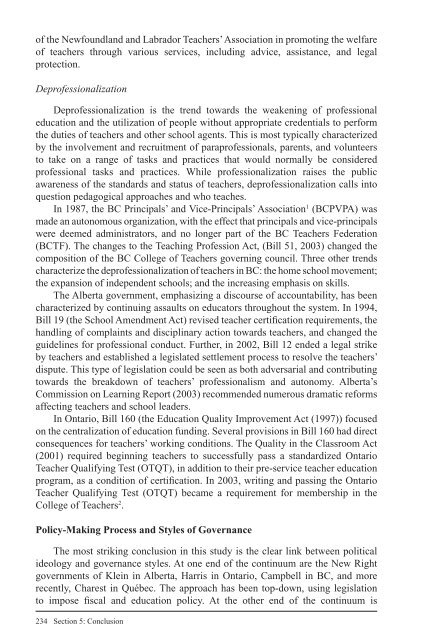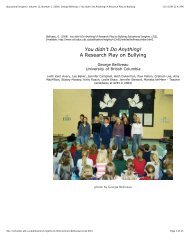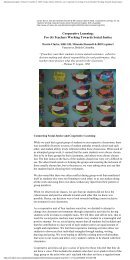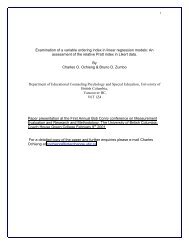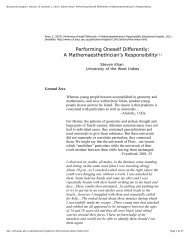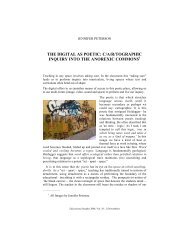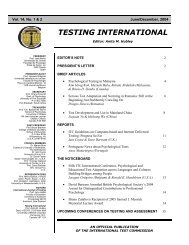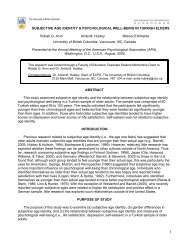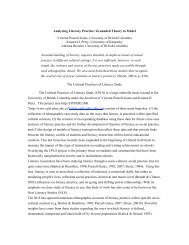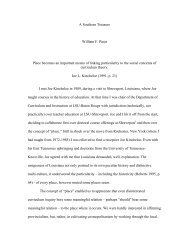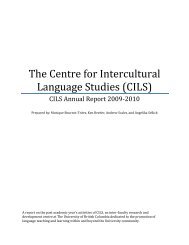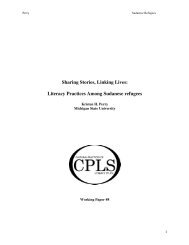The evolution of professionalism - Centre for Policy Studies in ...
The evolution of professionalism - Centre for Policy Studies in ...
The evolution of professionalism - Centre for Policy Studies in ...
Create successful ePaper yourself
Turn your PDF publications into a flip-book with our unique Google optimized e-Paper software.
<strong>of</strong> the Newfoundland and Labrador Teachers’ Association <strong>in</strong> promot<strong>in</strong>g the welfare<br />
<strong>of</strong> teachers through various services, <strong>in</strong>clud<strong>in</strong>g advice, assistance, and legal<br />
protection.<br />
Depr<strong>of</strong>essionalization<br />
Depr<strong>of</strong>essionalization is the trend towards the weaken<strong>in</strong>g <strong>of</strong> pr<strong>of</strong>essional<br />
education and the utilization <strong>of</strong> people without appropriate credentials to per<strong>for</strong>m<br />
the duties <strong>of</strong> teachers and other school agents. This is most typically characterized<br />
by the <strong>in</strong>volvement and recruitment <strong>of</strong> parapr<strong>of</strong>essionals, parents, and volunteers<br />
to take on a range <strong>of</strong> tasks and practices that would normally be considered<br />
pr<strong>of</strong>essional tasks and practices. While pr<strong>of</strong>essionalization raises the public<br />
awareness <strong>of</strong> the standards and status <strong>of</strong> teachers, depr<strong>of</strong>essionalization calls <strong>in</strong>to<br />
question pedagogical approaches and who teaches.<br />
In 1987, the BC Pr<strong>in</strong>cipals’ and Vice-Pr<strong>in</strong>cipals’ Association 1 (BCPVPA) was<br />
made an autonomous organization, with the effect that pr<strong>in</strong>cipals and vice-pr<strong>in</strong>cipals<br />
were deemed adm<strong>in</strong>istrators, and no longer part <strong>of</strong> the BC Teachers Federation<br />
(BCTF). <strong>The</strong> changes to the Teach<strong>in</strong>g Pr<strong>of</strong>ession Act, (Bill 51, 2003) changed the<br />
composition <strong>of</strong> the BC College <strong>of</strong> Teachers govern<strong>in</strong>g council. Three other trends<br />
characterize the depr<strong>of</strong>essionalization <strong>of</strong> teachers <strong>in</strong> BC: the home school movement;<br />
the expansion <strong>of</strong> <strong>in</strong>dependent schools; and the <strong>in</strong>creas<strong>in</strong>g emphasis on skills.<br />
<strong>The</strong> Alberta government, emphasiz<strong>in</strong>g a discourse <strong>of</strong> accountability, has been<br />
characterized by cont<strong>in</strong>u<strong>in</strong>g assaults on educators throughout the system. In 1994,<br />
Bill 19 (the School Amendment Act) revised teacher certifi cation requirements, the<br />
handl<strong>in</strong>g <strong>of</strong> compla<strong>in</strong>ts and discipl<strong>in</strong>ary action towards teachers, and changed the<br />
guidel<strong>in</strong>es <strong>for</strong> pr<strong>of</strong>essional conduct. Further, <strong>in</strong> 2002, Bill 12 ended a legal strike<br />
by teachers and established a legislated settlement process to resolve the teachers’<br />
dispute. This type <strong>of</strong> legislation could be seen as both adversarial and contribut<strong>in</strong>g<br />
towards the breakdown <strong>of</strong> teachers’ pr<strong>of</strong>essionalism and autonomy. Alberta’s<br />
Commission on Learn<strong>in</strong>g Report (2003) recommended numerous dramatic re<strong>for</strong>ms<br />
affect<strong>in</strong>g teachers and school leaders.<br />
In Ontario, Bill 160 (the Education Quality Improvement Act (1997)) focused<br />
on the centralization <strong>of</strong> education fund<strong>in</strong>g. Several provisions <strong>in</strong> Bill 160 had direct<br />
consequences <strong>for</strong> teachers’ work<strong>in</strong>g conditions. <strong>The</strong> Quality <strong>in</strong> the Classroom Act<br />
(2001) required beg<strong>in</strong>n<strong>in</strong>g teachers to successfully pass a standardized Ontario<br />
Teacher Qualify<strong>in</strong>g Test (OTQT), <strong>in</strong> addition to their pre-service teacher education<br />
program, as a condition <strong>of</strong> certifi cation. In 2003, writ<strong>in</strong>g and pass<strong>in</strong>g the Ontario<br />
Teacher Qualify<strong>in</strong>g Test (OTQT) became a requirement <strong>for</strong> membership <strong>in</strong> the<br />
College <strong>of</strong> Teachers 2 .<br />
<strong>Policy</strong>-Mak<strong>in</strong>g Process and Styles <strong>of</strong> Governance<br />
<strong>The</strong> most strik<strong>in</strong>g conclusion <strong>in</strong> this study is the clear l<strong>in</strong>k between political<br />
ideology and governance styles. At one end <strong>of</strong> the cont<strong>in</strong>uum are the New Right<br />
governments <strong>of</strong> Kle<strong>in</strong> <strong>in</strong> Alberta, Harris <strong>in</strong> Ontario, Campbell <strong>in</strong> BC, and more<br />
recently, Charest <strong>in</strong> Québec. <strong>The</strong> approach has been top-down, us<strong>in</strong>g legislation<br />
to impose fi scal and education policy. At the other end <strong>of</strong> the cont<strong>in</strong>uum is<br />
234 Section 5: Conclusion


